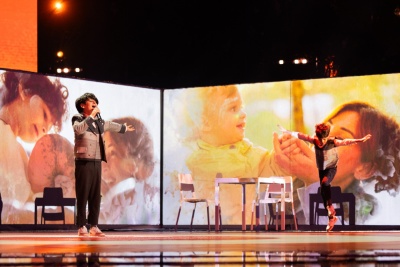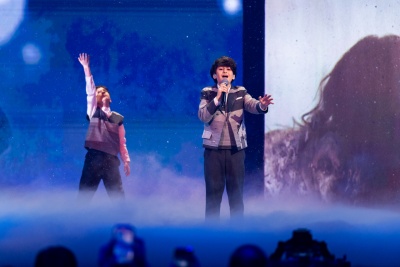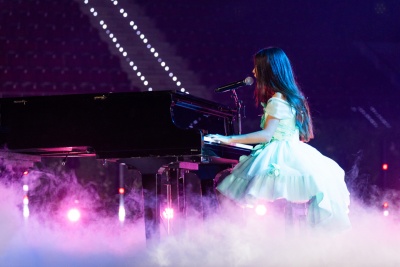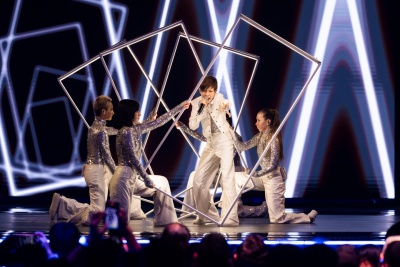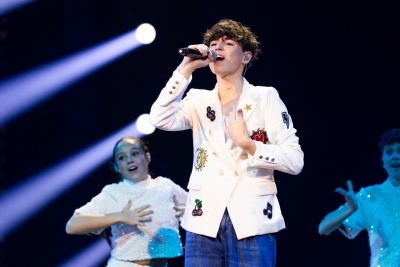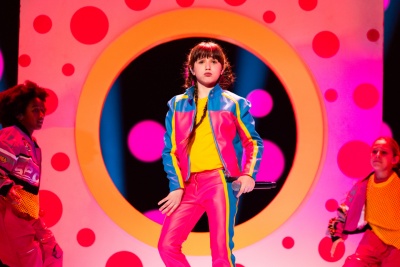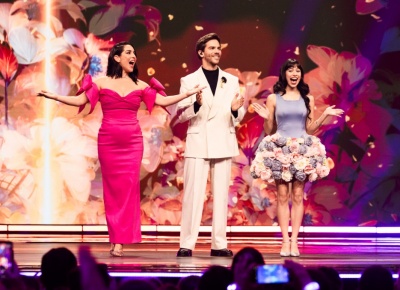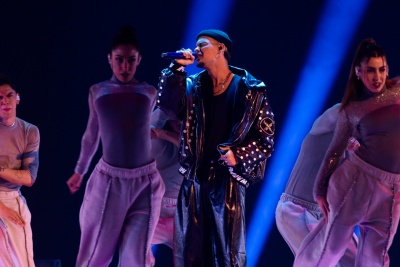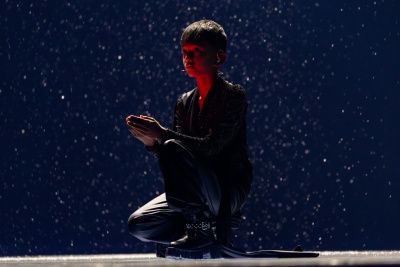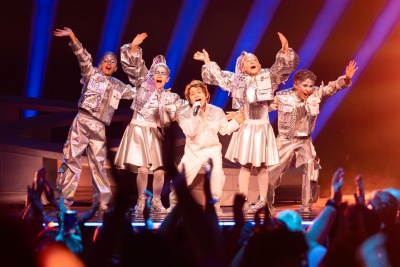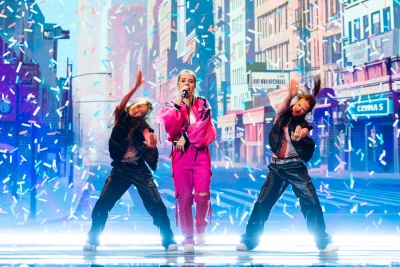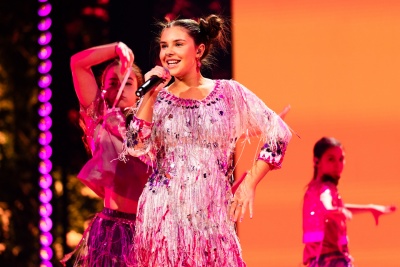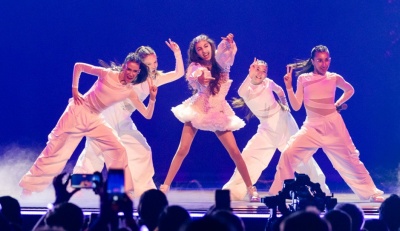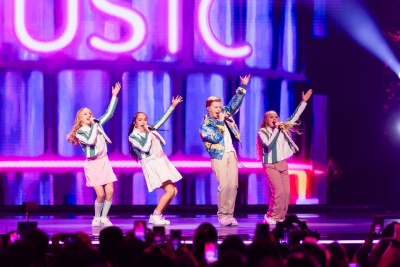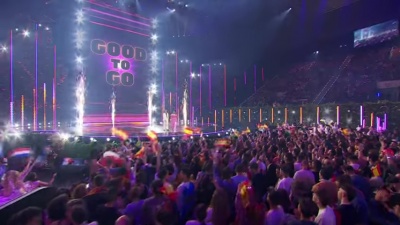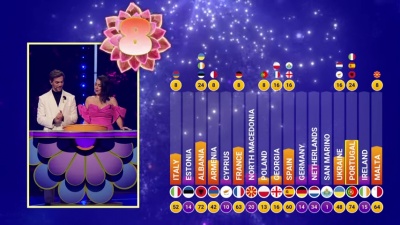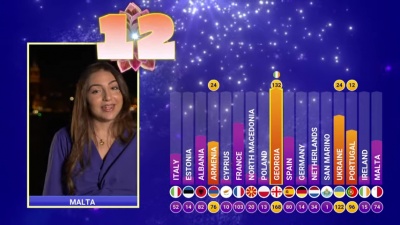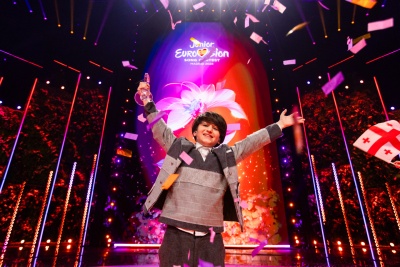Weaver's Week 2024-11-24
(Created page with 'Last week | Weaver's Week Index | Next week Grab a big glass of fruit squash, it's the == [[Junior E…')
Current revision as of 11:04, 24 November 2024
Last week | Weaver's Week Index | Next week
Grab a big glass of fruit squash, it's the
Contents |
Junior Eurovision Song Contest 2024
TVE / EBU, 16 November
"Hello, mum"
Yes, "To my mom" won this year's Junior contest. Written by Giga Kukhianidze and Maka Davitaia, sung by Andria Putkaradze, and entered by GPB (shown as "Georgia" on screen). It's the one with the singer's doppelganger dancing in the background, which is absolute genius staging.
The piano-led slowie starts with Andria sitting on a medium-sized chair at a medium-sized table, with back-projection walls making two sides of a house. Quickly, he stands up, moves away from the house, and bursts into the chorus. And goodness, Andria has got a powerful pair of lungs! Hits a complex set of notes, those minor-key changes they love in the east, and we're still only at the first chorus.
As we say, the song also features a dancer with a similar black bob haircut, and wearing a similar grey jacket and black trousers – complete with a little house embroidered on the pocket. The only difference: the dancer's jacket has no sleeves, helps him do all the pirouettes and turns.
There is back-projection on the walls of the little house, showing young Andria with his mother, and plenty of dry ice on the stage floor. The song is relatively simple: no extreme ornamentation, no complex beats. Don't need them, not when you've got some lyrical flourishes, a powerful voice, and heartfelt emotions.
Went down an absolute storm on the live broadcast: there's a little pause just before the chorus, and the crowd went wild there. And in the big notes towards the end of the chorus. And pretty much everywhere else. Technically, it's a superlative performance, and it captures an emotion perfectly; in those regards, it's very much like "The code" from the Senior contest.
Absolutely ran away with the jury vote: the cries of "Georgia! Georgia! Georgia!" made us wonder if this site's founder had started watching football already; although it didn't win the televote, there was enough public support to push it over the line.
Those medalling kids
The televote winner was "Esperança" by Victoria Nicole, representing TVP ("Portugal"). "By" is doing all the work here: Victoria co-wrote the music and lyric, and performed it herself. The song's a power ballad, the sort of tuneful ditty we might expect Ellie Goulding or Céline Dion to perform; after a gentle piano opening, Victoria stands up and addresses the crowd directly with a message of hope.
Junior Eurovision rules require that performances are primarily in the broadcaster's native language (or languages), but there can be some lyrics in another language. Usually, that other language is English; for "Esperança", it's Spanish, so the song goes down really well in the hall because most of the Madrid crowd can understand it.
Very much one for the Eurovision Olds: soft opening into loud chorus, lots of dry ice, wind machine, and the constant threat of a key change – though she never actually follows through.
Topped the public vote by a long distance – something like one-third of all votes contained a tick for this entry; fourth with the juries meant second overall.
Third place to "Hear me now" performed by Artem Kotenko for UA:PBC ("Ukraine"). The young man in the white suit sings over a pumping disco beat, and sings of longing for home – wherever that might be, and whatever might have happened to the city he once knew. Benefited from the staging: Artem's joined by four young women each holding a rectangular window frame, through which he'll step; they'll later turn into the frames of a telephone box, which he'll explode with the power of his voice.
Perhaps lost marks because it got rather repetitive: the last half of the song contains an interesting breakdown, but also about three repetitions of the chorus "na na na na na hear me now", which is hardly high art. Very distant second with the juries, just about second with the televoters, and because of numbers that translates into third place overall.
Hosts and winners
France Télévisions couldn't complete the three-peat; "Comme ci, comme ça" finished fourth for Titouan. Another young man in a white jacket, except we see that his fashion runs to badges and stickers to break up the lines. Just when we think we're in for another dreary emotional tune, Titouan snaps his fingers, backing dancers rush on, and the beat picks up.
The remainder of the song is a gloriously funky wig-out, complete with trumpet sections, and a message that makes sense even if you don't speak much French. «Oh là, là, là, on est comme ci, comme ça, différents, toi et moi» ("Jings, we're like this and that, different you and me"). One of the very few upbeat major key songs in the contest, it came third with the juries and fourth with the public (including one vote from this column, and it's the one we were humming on Monday lunchtime).
This year's actual hosts came in sixth place, "Como la Lola" was sung by Chloe DelaRosa for TVE ("Spain"). "Feisty" is the word here: Chloe seemed to come straight out of 1993, with a tracksuit in pink-teal-yellow, and from a room with pink polka dots on the walls. The song is close to Chloe's life story, a young girl who dreams of being like her idol Lola Flores. And like other heroes: Taylor Swift, Karol G, Olivia Rodrigo, and Shakira.
The song starts in a frenzy of ambition, and seems to get even more frantic as it continues. Chloe is joined by a couple of friends, then the walls of the room come down and she's joined by more. Everything happens at a tremendously fast pace, there's barely time to catch our breath before the next element is on screen. We'd be amazed – and more than a little disappointed – if that's the last we hear from Chloe.
As seems to be tradition, three hosts were required for the main show. Melani Garcia (TVE's singer here in 2019) presented from the green room, the big sister talking to this year's contenders. Ruth Lorenzo (TVE's singer at the grown-up contest in 2014) is a tremendous singer, and also hosts the local selection show Benidorm Fest. They were joined by Marc Clotet, a man in a white suit, a well-known actor in Spain. Everyone was competent, nobody overshadowed the singers, and Ruth filled well when there was an unexpected pause between songs. Job well done, we'd say.
The show is more than just the songs. The stage was a relatively small circle, perhaps a little confined – when they had all the singers on at the beginning and end, they could go from one end to the other. Video projection underfloor, and in a big narrow tower up at the back of the stage, the rest of the backdrop was coloured lights.
It's a brave choice of stage design, it allowed delegations to have a big video projection but only if they used the one angle where it worked. You could just about do "Heroes", but there were no big trouser press props that took forever to set up. Instead, mobile construction units seemed to be the order of the day – walls and tables and build-your-own boxes. Memorable staging, if it doesn't exactly seem to have broken the budget.
Last year's winning singer Zoë Clasure was featured in the introduction parade, alongside TVE's stars Maria Isabel and Sandra Valero. The interval act – "Time to Bloom" – featured a light-up ball and some ladders and lots of clear interpretative dance. The other interval act came from Abraham Mateo, who was a new name to this column, and we've been missing out.
Other songs of note
"Stilla Ckejkna" finished fifth, sung by Ramires Sciberras for PBS ("Malta"). Finished mid-pack in the jury vote, and third place in the public vote. The song is about Ramires's experience of adoption, he's one of very few Cambodian kids on the island. He likens himself to a little star, "with dazzling light, you found me".
Another song that went down really well in the hall, cheering throughout, almost eclipsing what was a very good technical performance. It's a rare outing for Maltese on the Eurovision stage, the PBS entry is usually sung in English. The staging featured a dark arena, eventually resolving to pictures of Ramires and his parents on the big screen. Pushed emotional buttons for a lot of people, and was the last song performed so was fresh in the mind when the televote re-opened.
"Cosmic friend" from Leo came eighth, he represents Eurovision powerhouse AMPTV ("Armenia"); the song was co-written by their 2021 winner Malena. It's a jolly song, about an alien who comes down to earth and meets Leo. What does the outerspace visitor want? Minerals? Intelligent life? Rock 'n' roll? Friendship! "Magical, different, interesting," is how Leo describes his friend; one might treat this as a parable for modern life and humanity's own little differences. Mid-table with the juries, rather ignored in the televote after being placed in slot 4 by the producers.
Stay Tuned for "Music", the AVROTROS entry they do show in the final. A good spectacle from the four-piece vocal group, carefully constructed for the Junior Eurovision competition. Lots of singing and dancing, fast cuts, plenty of energy. Perhaps the vocals were a bit soft at times, and we can understand why the juries put it well below halfway; a moderate televote ensured a 10th place finish. Got a vote from this column, in retrospect we ought to have gone with our next choice "Esperança".
We were always going to vote for "Tänavad", the entry from EER ("Estonia") performed by Annabelle. For many viewers, Junior Eurovision is about seeing someone you want to emulate, and this song oozed cool. A slick, syncopated beat underscored long gliding notes, before street dancers came on to make their mark. There's some really powerful singing, and a message that the kids today are alright, we've got to watch out for the old folks like their parents. However, we're outliers: third-bottom in the televote, a handful from the juries, tied 14th overall.
Tied with "Le Chéile", Enya Cox Dempsey for TG4 ("Ireland"). The title translates as "together", and is a testament to her determination to beat any challenges. All done with lots of backing dancers, an upbeat party tune – very different from TG4's last couple of entries – and some very colourful backing screens. Went on last-but-one, which became a forgettable sorbet between Victoria Nicole's power ballad and Ramires's heart-rending story.
There was no BBC entry this year, which was a desperate shame. Two broadcasters returned.
CyBC ("Cyprus") came back with "Crystal Waters" sung by Maria Pissarides. She was the entrant most likely to look like a cake decoration, brought a dance break and a song that tried a bit too hard to evoke "Fuego". Vocals were fine, composition didn't do much, and the diaspora televote could only pull the tune up to 13th.
SMRTV ("San Marino") returned with "Come noi", performed by Idols SM. The other four-piece group put forward a song inspired by K-pop, and we're convinced that there's a thoroughly brilliant song lurking in there. Sadly, we didn't hear it from Idols SM; at least one of them had pitchy vocals in the opening line and took forever to get her confidence back. A single point from the juries, plus a modest televote, meant that "San Marino" prop up the table. Guess they'll have to stick to what they're good at, like football.
We've used "he" and "his" a lot in this review. That's because JESC 2024 featured a lot of boys – something like half the performers, compared to some years when there's just one or two lads in the mix. Not entirely sure why this has happened, we presume there hasn't been an edict handed down from EBU Towers. Did it alter the contest? Not directly, though by giving the lads someone to look up to, it might help bring on other talents in coming years.
The experiments: postcards and results
The postcards were an experiment. Sticking with the theme of "let's bloom", the young singers were shown at home, then transformed into a crude cartoon representation via autocomplete bots. At this point, we start to look at the producers over the top of our spectacles, and ask, could TVE not afford real artists? Could they not get the entering broadcaster to commission a detailed picture, use their local equivalent of Ken Morse's Rostrum Camera to scan and pan in creative ways?
Instead, it looks like the producers used Luma Labs, an outside company, which asserts that it has "rights" to use all the inputted information as fodder for further autocomplete pictures. The results were not convincing: recognisable as a poor imitation of the real child, but tweaked to bring out what the computer expected to see. And all presented with that artificial sheen common to all autocomplete pictures.
We're very uneasy about this development. The ethics of using autocomplete bots instead of real artists is pretty poor. The ethics of using massive amounts of power and water for this low-quality animation is even worse. Very surprised it got to screen, and we very much hope not to see it again.
Speaking of not seeing unpopular Song Contest elements again, there was the ghost of an Address by Martin Österdahl, as the phrase "Good to go" appeared on the backdrop just before voting began. We understand that the EBU's Executive Scrutineer was greeted with a rousing chorus of boos and jeers at the Friday jury final, and decided that he might be best to stay off screen. However well he may do his administrative job, it appears that Mr. Österdahl has become the public face of disgruntlement towards the EBU.
Junior Eurovision is a place to experiment, and the most visible experiment was when they presented the jury votes. You know how they bring up the line to Pottsylvania, a spokesperson says "Thank you for a lovely show, here are the points from the Pottsylvania jury, and our 12 points goes to..."? Didn't do that. Instead, all of the 1 points were shown at once. All of them, adding up on a bar chart. Then they added in the 2 points, the 3 points, and so on up to the 10 points. They did go round the continent for the 12 points, added one by one.
Two clear advantages to this process. One: it's much quicker. To add the lower marks took a couple of minutes; to whip round the juries was only a little longer. Helped that the jury spokespeople were on tape, and edited together into a slick montage.
The other clear advantage: we had absolutely no way of knowing where any individual jury's Douze Point would go. There wasn't time to bring up the minor points, still less for us to absorb and figure out who had been missed.
...but these are also disadvantages. The jury vote was done in a flash, too quick for us to understand what was going on, and too quick for those in the hall. And it was borderline incomprehensible: Twelve Points flew about the screen, with no reason or predictability on where they were going.
If they're going to trial this at Senior, we're going to need some coaching. Get yer international Richard Osmans to do a video explaining it. And perhaps allow the spokeys to read out the 10 and 12 points, while highlighting the rest of the vote on screen. We are very much in favour of the slick edited package, there's nothing more irritating than a spokesperson who will not shut up and do their one job.
Overall, this column found it was a good – but not great – Junior contest, which is absolutely fine. Some songs will live in the memory for the right reasons, and we're sure that friendships were formed to last a lifetime. We do not object to the EBU experimenting with ideas, and we expect that the less successful trials will not be repeated. We certainly appreciate the artistry from the winning song, and we're very comfortable with the grand prix going to "To my mom".
Next year, in Tbilisi?
In other news
To nobody's surprise, ITV have ordered another series of Big Brother. The second series ended last week, and was won by one of the contestants.
Quizzy Mondays
Perfect rounds on Mastermind are like buses: you wait weeks for one, then two turn up in a row. Ian Grieve got all eleven on Richard Feynman, Richard Kimber paraded a dozen on badgers. Ian Grieve had the stronger general knowledge, and won the match; his total of 28 marks him out as a very strong contender for the next round. Credit also to Dimitri Sameresinghe, a little off the pace after specialists, but went hell-for-leather in a brisk GK set.
Tie-breaks on Only Connect are like buses: you wait weeks for one, then two turn up in a row. Bloomsbury Group spotted "Done and dusted", after a sharp and careful quiz. Highlights included "half-and-half" in international cuisine, a double-sequence both converging to "Pryce", and a spot of numbers shifted one letter later in the alphabet: so obvious when we see it, but we'd never have got it in 40 seconds. Bloomsbury Group were able to show they were full of vim and vigour in the walls, their rivals Too Many Cookes spotted songs from the longest running musicals.
"Do you hear the people sing? Not on this royalty settlement, you don't!" Impromptu performances of musicals require special licenses, which are very expensive, and the rights may simply not be available. This cuts both ways: if you're a contestant on a reality show and you don't want something to be shown, all you've got to do is launch into a chorus of "I dreamed a dream" or "Joseph's coat" and the footage becomes unusable.
UCL won the first repechage match on University Challenge, defeating St Andrews by 215-105. Strong bonus games from both sides (UCL 68%, St Andrews 72%), the difference was UCL's superbuzzer Josh Mandel, who got eight starters and drew four incorrect interruptions from the other side. A round on 4th declension Latin nouns turned out much easier than it sounded; descriptions of settlements in the 1700s proved most entertaining. St Andrews' captain Freddie Skerrett ended by picking the right answer from two options presented by his team.
Pass the teacakes, it's Bake Off finals night (C4, Tue). Pass the glitter, RuPaul's Drag Race concludes (BBC3, Thu). Pass the saxophone, the BBC Young Jazz Musician of the Year is announced (BBC4, Sun). Pass the trail boots, some new walks in Am Dro! (S4C, Sun).
Next Saturday, it's musicals week on Strictly Come Dancing, Alexander Armstrong pops up on The Wheel, and Christopher Biggins on The Chase Celebrity Special.
To have Weaver's Week emailed to you on publication day, receive our exclusive TV roundup of the game shows in the week ahead, and chat to other ukgameshows.com readers, sign up to our Google Group.

